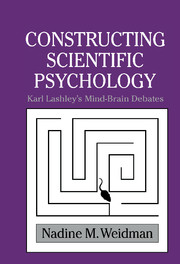Book contents
- Frontmatter
- Contents
- Preface
- Acknowledgments
- List of abbreviations
- Introduction
- 1 Lashley and Jennings: The origins of a hereditarian
- 2 Lashley, Watson, and the meaning of behaviorism
- 3 The pursuit of a neutral science
- 4 Neuropsychology and hereditarianism
- 5 Psychobiology and Progressivism
- 6 Psychobiology and its discontents: The Lashley-Herrick debate
- 7 Hull and psychology as a social science
- 8 Intelligence testing and thinking machines: The Lashley-Hull debate
- 9 Pure psychology
- 10 Public science and private life
- 11 Genetics, race biology, and depoliticization
- Epilogue: Lashley and American neuropsychology
- Appendix: Archives holding Lashley material
- Bibliography
- Index
7 - Hull and psychology as a social science
Published online by Cambridge University Press: 16 September 2009
- Frontmatter
- Contents
- Preface
- Acknowledgments
- List of abbreviations
- Introduction
- 1 Lashley and Jennings: The origins of a hereditarian
- 2 Lashley, Watson, and the meaning of behaviorism
- 3 The pursuit of a neutral science
- 4 Neuropsychology and hereditarianism
- 5 Psychobiology and Progressivism
- 6 Psychobiology and its discontents: The Lashley-Herrick debate
- 7 Hull and psychology as a social science
- 8 Intelligence testing and thinking machines: The Lashley-Hull debate
- 9 Pure psychology
- 10 Public science and private life
- 11 Genetics, race biology, and depoliticization
- Epilogue: Lashley and American neuropsychology
- Appendix: Archives holding Lashley material
- Bibliography
- Index
Summary
Prologue
In The Triumph of Evolution, the historian Hamilton Cravens argued that by 1941 many natural and social scientists working in the United States had managed to resolve their ancient dispute over the relative values of nature and nurture in development. Heredity and environment were interdependent, cooperating factors, they concluded; their effects were not separable, nor was one more important than the other.
Earlier in the century, according to Cravens, most biologists, psychologists and sociologists had tended to come down on one side or the other, stressing the role either of innate constitution or of learned behavior. But by 1941 they had “recognized the complexity of human nature and behavior” and declared the nature-nurture dichotomy “artificial, unproductive and perhaps unscientific.” Eager to take up new questions, life scientists formulated a new interactionist model: on the basis of this new synthesis they forged a science of man, a truly interdisciplinary study of humanity that took into account both biological and cultural evolution. This triumph of evolution and resolution of the controversy ushered in an era of interdisciplinary scholarship.
The resolution of this longstanding controversy, however, was far from a universal conclusion. While many prominent life scientists did indeed pronounce a harmonious end to the dispute, in less visible or less public arenas the old debate continued to rage unabated, and continued to exert a powerful influence on the sciences of life and mind.
- Type
- Chapter
- Information
- Constructing Scientific PsychologyKarl Lashley's Mind-Brain Debates, pp. 119 - 127Publisher: Cambridge University PressPrint publication year: 1999



